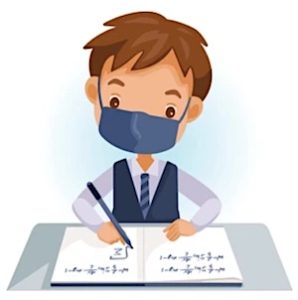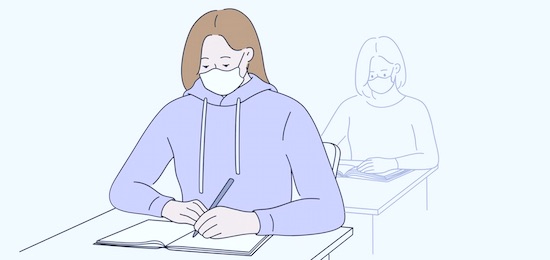Listening to the Voices of My 6, 7 and 8th Graders
A MiddleWeb Blog
 I decided to try something different. Educators, students, and parents have had their hands full this school year.
I decided to try something different. Educators, students, and parents have had their hands full this school year.
So for this final post of the most challenging school year ever, I went specifically to my students and asked them, “What would you like Mr. Hyler to write about for his MiddleWeb blog? Is there something you want to share with the education world?”
I opened it up for a whole class discussion, and I invited students to send me an email if they weren’t comfortable talking in class in front of their peers.
I feel it’s important to let student voices be heard – most often they don’t have a big platform, at least among the adults. I asked my 6th, 7th and 8th graders to contribute, and I have broken the post down into those three grade levels.
Here are some things the kids in our small public school had to say and my brief reflections on each grade I worked with this year.
8th Grade:
- Teachers seemed harder when it came to dealing with online students, but maybe it was justified so those students would get things done.
- There is a lot of drama in middle school about various topics; how friends behave, boys, dating, racism, and LGBTQ rights.
- Normal school days are not fun with Covid protocols including lunch, gym time, lockers, hallways, etc. School doesn’t feel the same and it doesn’t feel like a safe place to be anymore.
- Really enjoyed the fact that things are paperless due to online learning. Made it less likely to lose papers for classes and there was no keeping track of folders or binders.
I didn’t have the chance to work with both our 8th grade sections this year. However, the section I had for advisory class kept me on my toes all year long. They were loud, pushed boundaries, and questioned just about everything. Yes, in my opinion they were typical 8th graders.
This particular class always amazed me. Their thoughts on this past school year definitely showed me they were paying attention to everything. While doing the hybrid model, I know I was harder on the online students because most middle school students are not mature enough to handle online classes while at home by themselves.
The statement about how face-to-face school doesn’t feel safe anymore is really revealing. For this student and many others, their social-emotional mindset suffered. The pandemic caused tremendous anxiety, especially those that needed school to be their safe place.
7th Grade:
- Teachers needed to balance online and face-to-face learning with students. Sometimes in the hybrid model, online students seemed left behind or ignored.
- When everyone was online, it was hard. Getting motivated to do work was hard. There were too many distractions.
- Sexist and racist behavior is an issue and needs to be monitored all the time in school.
- Telling students to work harder doesn’t really help. Everyone works at their own pace and teachers should have patience.
I had the privilege of seeing 7th graders for science this year. This group of students had their ups and downs, but overall were a compassionate group of kids who do care about their learning and their school overall. The comment about how hard it was to be motivated this year while online shows their maturity and how they do truly care about what school can offer.
The last thing I want to highlight with this group is what was said about sexist and racist behavior. I failed to say anything above with the 8th graders, but not on purpose. Say what you will about how the pandemic has highlighted these issues, but in all honesty, it has always been an issue, and I feel that our political landscape has added more fuel to this fire.
This in turn trickles up and down. When students overhear things at home, it is then taken into the schools. Systematic racism and prejudice are a problem, and if our 12-year olds are aware enough to bring it up in a survey like this, we need to pay close attention. We have an obligation to address prejudice and privilege and make the necessary changes.
6th Grade:
- There shouldn’t be homework. It stresses students out and for some it is hard with our home situations.
- Respect for respect. If teachers respect students, students will in return for the most part. Teachers can demand respect if and when they treat students with respect.
- School didn’t feel like a place to escape with all of the protocols that had to be followed for Covid-19.
- Teachers seemed more strict with everything going on with the pandemic.

Sixth graders seemed to focus more on discipline and not wanting homework. They did mention school was not an escape for them this year, so it is not just one grade level feeling this way. Most students were feeling that school should be a safe place for them.
I have to defend my fellow teachers given the comment about teachers being more strict. As teachers we had a lot more added to our plate this year, and if we seemed a little grumpy, it was certainly warranted. I don’t think there was a teacher this year who wasn’t happy about the school year ending. I know we tried to not take it out on the kids, but they are pretty perceptive.
Closing Thoughts
This blog post wasn’t about my voice or what was going on in my classroom or school district. Perhaps readers who work in schools didn’t get much that’s new to you out of this post. We are all exhausted and need the summer to heal, rejuvenate, and rediscover the passion that we have for teaching.
But we also need to listen to our students. They have had a difficult year too and with more issues arising than just being online. Their world has been rocked. If my readers can take one thing away from this post and reflect on it over the summer, then I feel that students have been heard.
So, if you haven’t finished your school year yet, maybe spend the last few days asking students how they are feeling and what they are thinking before they depart for summer break. Let them give you some insight on what you might be able to change next year in your teaching (or your leadership) to make school a better experience.



































